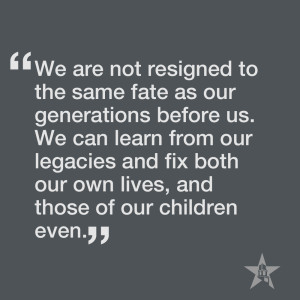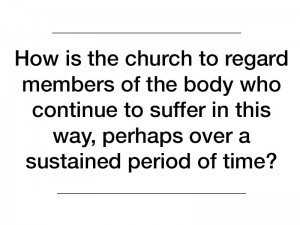Not many people know that I come from a long line of men and women with depression and suicidal attitudes, including two suicides within my lifetime. In fact, my uncle killed himself the month before I came to Houghton. Firsthand, between high school and college, I have experienced the mind and body numbing effects of depression on my body, my mind, and my soul. As you can imagine, I have spent many hours wondering about my family history, my legacy of mental illness. Now, recently becoming engaged to be married, the fear that I will pass on such a legacy to my future children is crippling. Can there truly be nothing new under the sun? Are we doomed to struggle under the difficulties of our parents, and their parents before them?

I have found my comfort in psychology. To those of you not familiar to the discipline, that may sound as though I have found comfort by embracing the cold sterility of scientific reasoning and the dissociation from emotional expression. Quite the opposite in my case.
Echoed throughout all psychology courses and sub-disciplines, students are taught the complex relationship between nature and nurture, which was debated long before psychologists first began questioning this relationship. Are we just a product of our circumstances, our culture, our family and friends, or are we just
pre-programmed by a script of code by a genetic instruction manuals? The simple fact is both nature and nurture are critical to our lives, and they are so intertwined in their effects that is impossible to trace an element about ourselves to one locus point.
Yes, depression seems to run as a swath through the genetic code, but as I realized over my very depression-wrought sophomore year, there is more than genetics involved in the severity of depression in a person’s life. In my extended family, alcohol is a large environmental factor that has systematically ruined many lives. I don’t mean drinking alcohol in moderation is inherently corrupting or evil. However, drinking was, and still is used by large portions of my extended family as an escape, one that they use daily. My uncle was always depressed, but it was when he was drunk that his suicidal thoughts became so severe that he enacted them. He was drunk on the night he shot himself. My grandmother was reduced to a husk of her former self by her alcoholism, which destroyed the relationship my mother wished to have with her in her teenage years. This is why my mother abstains from all alcohol, and why I have determined never to drink as an escape. Alcohol lowers inhibition and lets the chilling claws of depression sink in.

The failings in family’s legacy also taught me something else important in my battle with depression: the dangers of societal withdrawal. My uncle lived alone in a two story house, my grandmother spent a great deal of time away from her children and husband even within her own house, and my great-uncle’s body wasn’t discovered in his trailer until days after he killed himself. I’m not saying a romantic and/or sexual relationship combats depression (though I believe a healthy one may), it is making connections to even one friend that can act as a lifeline in particularly low times. My girlfriend was my lifeline during my sophomore year, but I learned the value of having many lifelines by finding friends who truly cared about my well-being. Houghton is one of the best places to find those connections, and I urge you to seek them out.
My legacy has left me with a lifelong struggle of depression, but it has taught me what exacerbates depression, such as alcoholism, and cutting off social and familial ties. We are not resigned to the same fate as our generations before us. We can learn from our legacies and fix both our own lives, and those of our children even if we can never solve the entire problem. This is what I seek to do, and I hope you all do as well, whether the topic relates to depression, abuse, spirituality, or sexuality.
Kevin is a senior majoring in psychology and writing.

